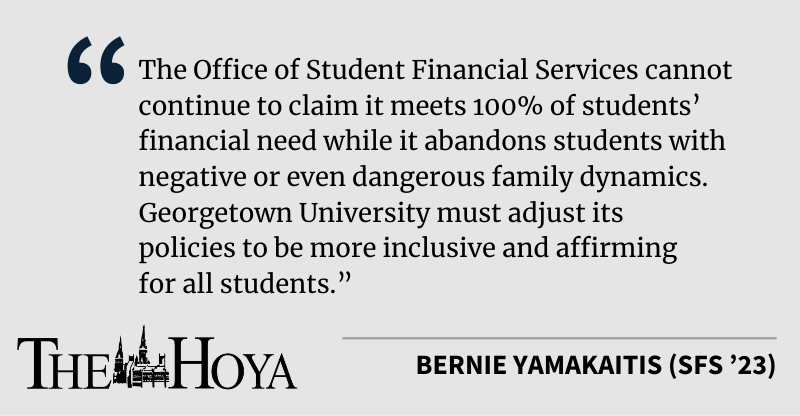This piece discusses transphobia, abusive relationships and suicide. Please refer to the end of the article for on- and off-campus resources.
For many students, especially LGBTQ+ students, family relations are incredibly complex and can change in the blink of an eye. Yet far too often, the Office of Student Financial Services fails to take these relationships into account when students request aid adjustments because of traumatic family experiences.
On Oct. 11, 2020 — National Coming Out Day — I took the nerve-racking step of telling my parents not only that I’m transgender, but also that I had started to medically transition by taking testosterone. For me, I knew that beginning my medical transition was necessary for my mental health. My parents reacted as I predicted they would; they told me they would no longer support me financially, which included paying for Georgetown University-related expenses. This absence of support was quickly made worse by Georgetown’s failure to offer me any substantial assistance as I sought a way to continue my education.
Hoping that my parents would change their minds, I waited until December 2020 to contact the Office of Student Financial Services. I sent a short email to my financial aid officer briefly explaining my situation and asking for further assistance in filing as an independent student for the spring term.
My financial aid officer responded two days later with an equally brief email.
“Our committee has reviewed your applications and your family situation but it is not possible for us to make you independent at this time. We understand the strained relationship with you and your parents and I hope that they will find a way to continue to support you in your efforts to continue to be successful and graduate from Georgetown,” the officer wrote.
As I read the email, I felt angry. The OSFS had never even offered me the opportunity to fill out a formal application for independent status. I felt the financial aid office was assuming that my parents’ deeply entrenched transphobia was just a simple parent-child squabble that I should be able to solve.
I reached out to the Georgetown Scholars Program on the advice of a friend. The program’s associate director responded almost immediately and offered to talk to financial aid himself. Yet the GSP associate director said the financial aid office never responded to his emails.
Now, over four months after I came out to my parents, I am no longer on speaking terms with my mother. My father, who insists on maintaining some sort of relationship, will not cosign a loan for me because he thinks it would enable my “lifestyle.” I am unable to obtain a private loan without a cosigner because I have not developed a sufficient credit score. I am already in a large amount of debt because of a suicide attempt in 2019 that led to a hopsitalization that my insurance did not cover. On the advice of the dean of students at Georgetown, I asked my aunt to cosign a loan; however, she also refused, saying I should just appease my parents and go back into the closet until college is over.
The OSFS proposed a compromise of sorts Feb. 12, offering me an additional unsubsidized loan that covers only one-fifth of the amount I still owe to Georgetown.
I find the OSFS’s refusal to help me incredibly disheartening. While I am no expert on the inner workings of financial aid, there must be a way to establish assistance for students when parents or guardians refuse to contribute financially to their children’s education. For instance, the OSFS could establish an emergency fund for such students or offer the chance to reapply for aid as an independent student after their aid has already been decided.
Georgetown takes pride in the fact that it is need blind in its admissions process and that it meets the full extent of students’ financial aid needs based on the FAFSA and CSS profile. Yet the university still leaves many students to fend for themselves.
Students, especially those in the LGBTQ+ community, may suffer from complicated and abusive family dynamics. Circumstances can change instantaneously if a student is outed or can no longer put off life-saving trans health care. The OSFS cannot continue to claim it meets 100% of students’ financial need while it abandons students with negative or even dangerous family dynamics. The university must adjust its policies to be more inclusive and affirming for all students.
As of right now, I have an unpaid balance that is still based on my parents’ expected family contribution, and I have few options remaining to continue my education. I am continuing to attend classes while living on campus in the hopes that something somewhere changes.
The constant stress is difficult to handle, but I hope that shedding light on how the OSFS has handled my situation will make the university realize ignoring the needs of LGBTQ+ students is unacceptable.
Bernie Yamakaitis is a sophomore in the School of Foreign Service.
Resources: On-campus confidential resources include Health Education Services (202-687-8949), Counseling and Psychiatric Services (202-687-6985 or 202-687-6985 for after-hours emergencies) , and the LGBTQ Resource Center (202-687-3546). Off-campus and virtual resources include HoyaWell (24/7 telemental health services), Trevor Project emergency hotline (1-866-488-7386), and the Washington, D.C. Access HelpLine (1-888-793-4357).









